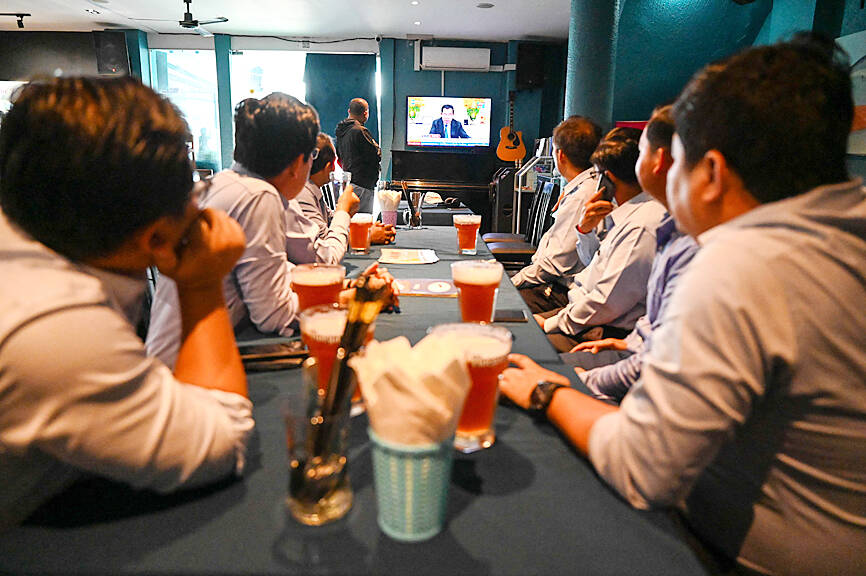Cambodian Prime Minister Hun Sen, one of the world’s longest-serving leaders, yesterday said he would resign and hand power to his eldest son after almost four decades of rule.
The former Khmer Rouge cadre has run the kingdom since 1985, eliminating all opposition to his power, with opposition parties banned, challengers forced to flee and freedom of expression stifled.
His Cambodian People’s Party (CPP) won a landslide victory in an election on Sunday with no meaningful opposition, taking 82 percent of the vote, paving the way for a dynastic succession to his eldest son that some critics have compared to North Korea.

Photo: AFP
“I would like to ask for understanding from the people as I announce that I will not continue as prime minister,” the 70-year-old said in a special broadcast on state television.
Election authorities disqualified the only serious challenger, the Candlelight Party, on a technicality in advance of the election, and the CPP is expected to win all but five lower house seats.
The government hailed the 84.6 percent voter turnout as evidence of the country’s “democratic maturity,” but Western powers including the US and EU condemned the poll as neither free nor fair.
Hun Sen said that Hun Manet, a 45-year-old four-star general, would take over as prime minister at the head of a new government on the evening of Aug. 22.
“I ask people to support Hun Manet who will be the new prime minister,” he said.
Hun Sen has trailed the handover to his son for a year and a half, and the 45-year-old played a leading role in campaigning for Sunday’s vote.
The outgoing leader has made it clear that he still intends to wield influence, even after he steps down, scotching the notion the country could change direction.
In his announcement yesterday, he said that he would become president of the senate and act as head of state when the king is overseas.
Under Hun Sen, Cambodia has tacked close to Beijing, benefiting from huge Chinese investment and infrastructure projects, including the redevelopment of a naval base that has alarmed Washington.
China welcomed Sunday’s election, with Chinese President Xi Jinping (習近平) sending Hun Sen a personal message of congratulations.
The flood of Chinese money has brought problems, including a rash of casinos and online scam operations staffed by foreign workers, many trafficked and toiling in appalling conditions.
Critics say his rule has also been marked by environmental destruction and entrenched graft.
Cambodia ranks 150th out of 180 in Transparency International’s corruption perception index. In Asia, only Myanmar and North Korea rank lower.
Rights groups accuse Hun Sen of using the legal system to crush any opposition to his rule — including critical activists and troublesome union leaders as well as politicians.
Scores of opposition politicians have been convicted and jailed during his time in power and the law was changed ahead of Sunday’s election to make it illegal to call for voters to spoil ballots.

Kehinde Sanni spends his days smoothing out dents and repainting scratched bumpers in a modest autobody shop in Lagos. He has never left Nigeria, yet he speaks glowingly of Burkina Faso military leader Ibrahim Traore. “Nigeria needs someone like Ibrahim Traore of Burkina Faso. He is doing well for his country,” Sanni said. His admiration is shaped by a steady stream of viral videos, memes and social media posts — many misleading or outright false — portraying Traore as a fearless reformer who defied Western powers and reclaimed his country’s dignity. The Burkinabe strongman swept into power following a coup in September 2022

‘FRAGMENTING’: British politics have for a long time been dominated by the Labor Party and the Tories, but polls suggest that Reform now poses a significant challenge Hard-right upstarts Reform UK snatched a parliamentary seat from British Prime Minister Keir Starmer’s Labor Party yesterday in local elections that dealt a blow to the UK’s two establishment parties. Reform, led by anti-immigrant firebrand Nigel Farage, won the by-election in Runcorn and Helsby in northwest England by just six votes, as it picked up gains in other localities, including one mayoralty. The group’s strong showing continues momentum it built up at last year’s general election and appears to confirm a trend that the UK is entering an era of multi-party politics. “For the movement, for the party it’s a very, very big

ENTERTAINMENT: Rio officials have a history of organizing massive concerts on Copacabana Beach, with Madonna’s show drawing about 1.6 million fans last year Lady Gaga on Saturday night gave a free concert in front of 2 million fans who poured onto Copacabana Beach in Rio de Janeiro for the biggest show of her career. “Tonight, we’re making history... Thank you for making history with me,” Lady Gaga told a screaming crowd. The Mother Monster, as she is known, started the show at about 10:10pm local time with her 2011 song Bloody Mary. Cries of joy rose from the tightly packed fans who sang and danced shoulder-to-shoulder on the vast stretch of sand. Concert organizers said 2.1 million people attended the show. Lady Gaga

SUPPORT: The Australian prime minister promised to back Kyiv against Russia’s invasion, saying: ‘That’s my government’s position. It was yesterday. It still is’ Left-leaning Australian Prime Minister Anthony Albanese yesterday basked in his landslide election win, promising a “disciplined, orderly” government to confront cost-of-living pain and tariff turmoil. People clapped as the 62-year-old and his fiancee, Jodie Haydon, who visited his old inner Sydney haunt, Cafe Italia, surrounded by a crowd of jostling photographers and journalists. Albanese’s Labor Party is on course to win at least 83 seats in the 150-member parliament, partial results showed. Opposition leader Peter Dutton’s conservative Liberal-National coalition had just 38 seats, and other parties 12. Another 17 seats were still in doubt. “We will be a disciplined, orderly